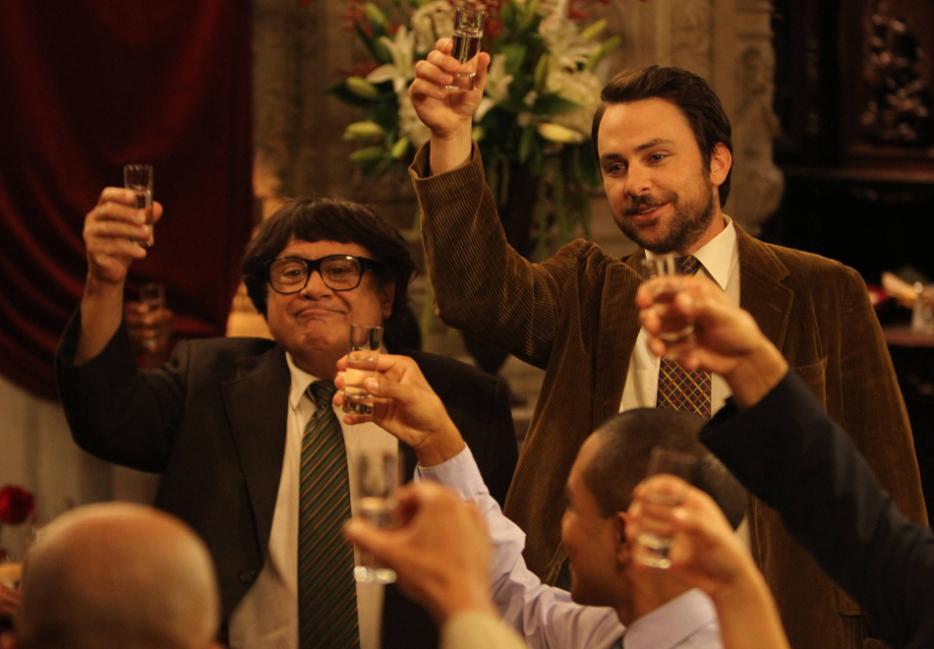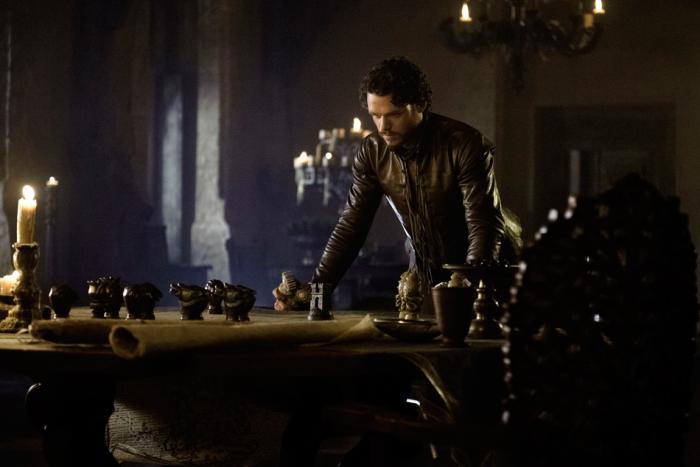Though it gets more credit for its mangled black humour, It’s Always Sunny in Philadelphia is also one of television’s most self-aware shows (albeit in a much less flashy way than something like Community). As such, it’s hard not to take the opening of its ninth season as bit of a wink and a prod. The normally excitable Sweet Dee—as with just about everything about this show, that description is a considerable understatement—sits bedraggled, mindlessly eating a “garbage cake” (just a cake found in the garbage, not literally made from it). As the gang—Dennis, Frank, Mac, and Charlie, in descending order of pure sociopathy—attempts to fling insults at her, she shoots them down in turn, predicting each barb with silencing efficacy. In a matter of minutes, they have nothing to say.
Any show that hits its ninth season is bound to be firmly in a groove, but I don’t know that even Sunny’s most prissy critics would have suggested that viewers were in for another season of eating reclaimed garbage and listening to the same old insults. Score one for anticipating criticism.
Always Sunny is a more static environment than most, although in this case, that’s hardly a bad thing. It is the rare comedy that nailed its formula in the first episode—one of the show’s best lines happened in its first few minutes: “Dreams are like pictures: Unless they’re of me or someone is having sex, I don’t care”—and hasn’t ever felt like it needed or was under any pressure to evolve. Never mind that the closest thing to a multi-episode arc is Fat Mac; like 90% of the episodes follow an identical formula, down to having the same people hit the same plot notes (which the show, naturally, pointed out in an episode where the gang tries to break into a home).
This is, of course, nothing new in sitcom land, which basically relies on the same people doing more or less the same thing in the same way to such an extent that any time a show stops doing that, we feel uncomfortable even calling it a sitcom (see: Louie). Even shows that ostensibly try to incorporate some kind of change over their run—The Office or Parks and Recreation are the more prominent recent examples—tend to end up shuffling pieces but relying on the same deep-rooted formula: Jim and Pam get together, but it’s still just the two of them against Dwight’s weirdness and Michael’s neediness. Always Sunny is a touch extreme, in that even the gang’s superficial details (jobs, significant others, desires, or lack thereof) remain the same, but adherence to formula is basically what makes a sitcom a sitcom, laugh track or no.
Where Always Sunny makes it brilliant hay, though, is in that extreme itself. Like The Talking Heads and Tom McCarthy, the show has realized that if nothing ever changes, nothing ever matters. Where Seinfeld used this to mingle with the minor absurdities of life and indulge in petty narcissism, It’s Always Sunny in Philadelphia uses it as a Sartrean void, a vast expanse into which it can drain the black blood of humanity’s worst impulses.
This is pretty purely distilled in season nine’s second episode, which takes on the gun debate in typically nihilisticSunny fashion. Inflamed by Frank’s story about being mugged—delivered, guns akimbo, on a nightly news broadcast—the gang gets all hot for different reasons. Mac and Charlie, worried about the lack of guns on the streets, dress in denim and eagle T-shirts and set out to defend a school with a revolver and a katana; Dennis and Dee, outraged at the number of guns on the streets, resort to increasingly shady methods to procure an assault rifle to prove the others wrong about how easy said firearms are to obtain. Their combined selfish stupidity eventually gets them to switch their respective opinions, before it’s revealed that the whole furor was kicked up by a scheming Frank in attempt to try to sell some guns.
There’s plenty of acidic skewering of both political sides of the issue—“There’s a lot of score-settling going on in there,” Charlie tells Mac after they give a few dozen kids makeshift weapons with which to “defend” themselves—but unlike, say, South Park, there’s no reasonable third option. You’re all a bunch of idiots; end of message. The closest the episode comes to a point is that Frank’s greed is the only pure motivation, but given how regularly he blows his money, it would be a stretch to even suggest that. As with most Always Sunny episodes, things that happen are just excuses to be horrible to everyone else in pursuit of your own selfish ends—and even in that competition, winning won’t really do anything for you.
As a comment on the futility of both sitcoms and life, that’s a little bleak. In comedic practice, though, it’s gold: It’s Always Sunny in Philadelphia is free to go anywhere and do basically anything in the service of a joke, which gives it an off-kilter vitality that most sitcoms, holding to their own arbitrary rules in a meaningless universe, can’t even touch.





